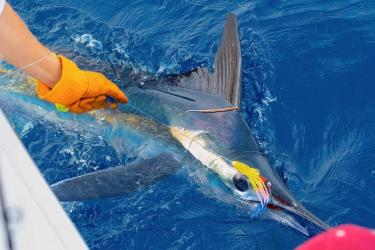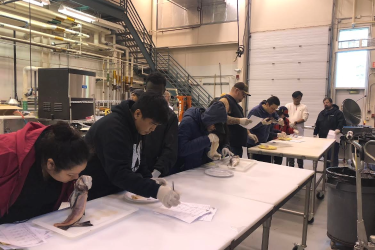Where did you grow up?
I grew up in a small town in Idaho named Soda Springs. It’s barely a blip on the map, but spending my childhood years there was an incredible experience and one that I wouldn’t change for the world. When I entered the seventh grade my family moved to another small community in Grosse Ile, Michigan. What a culture shock that was! Within the span of a couple of days I went from potato country to the Motor City—two environments that completely contrasted in every way. It was an interesting and difficult transition at times but in the end, I think it helped prepare me for interacting with a wide variety of people from different backgrounds.
Where did you go to school and in what subject did you get your degree(s)?
I completed my undergraduate work at Texas A&M University in Galveston where I received my Bachelor’s of Science in Marine Biology. After a few years and while working as a contractor for the center in Galveston focused on fishery ecology, I decided it was time to continue my education. So I enrolled in night classes at the University of Houston in Clear Lake where I received my Master’s of Science in Environmental Science. After that I decided I’d had enough sitting in a classroom for a while and was ready to get to work.
How did you come to work at the Southeast Fisheries Science Center?
I actually had a pretty direct path to working at the center. While completing my undergraduate degree at Texas A&M, I worked for my invertebrate zoology professor processing benthic samples in his lab. I continued to work in his lab after graduation when a contract position became available in Galveston. I applied for it and was hired!
What do you do at the science center?
Technically I’m a research fishery biologist, but I really consider myself a jack of all trades. I started as a lab technician focused on nekton and benthic sample collection and organism identification, which I’m able to get back into the lab to do occasionally. On the research side of things I develop and conduct projects that incorporate habitat ecology and community dynamics to assess effects on abundance and distribution patterns of fishery species. Lately I’ve been focused on changes to estuarine communities due to the climate change-induced range expansion of black mangroves in the northern Gulf. I’m heavily involved in queen conch research and continue to pursue projects that will contribute to our knowledge and management of the species. I’m also the vessel operations coordinator in Galveston, so I’m responsible for staff training and maintenance and repair of our boats, which is another aspect of my job that I really enjoy.
What do you like most about your position?
Hands down, my favorite part of my position is getting out into the field. Whether that’s snorkeling in the Caribbean, trudging through the muddy estuaries of the Gulf Coast, or conducting experiments in our wet lab. Those moments when I’m actively engaged in the hands-on data collection and research process are the most fulfilling and give me the most personal satisfaction—plus field work also keeps me sane! I also enjoy the wide variety of research topics and projects that I get to be involved with.
What advice would you have for someone interested in a career at NOAA Fisheries?
Of course something that we hear all the time is to volunteer, volunteer again, and then volunteer some more if you’re able. That certainly was a key factor leading to my employment with NOAA, but I also advise students and others just getting started on their careers to be open to getting involved with all aspects of marine science. A lot of us are initially drawn to this field because we see the attention given to charismatic species such as sea turtles and marine mammals, but there may be more opportunities available to study or work with other less high-profile, but just as important, organisms and environments. The marine ecosystem is immense and inter-connected. Don’t restrict yourself to a confined topic because even the small things have an important role to play and deserve our attention.
Is there a book, quote, or person that influenced you to be the person that you are today?
It’s difficult to pinpoint just one in particular since I like to think that I’ve been able to pick up valuable insights from influential sources I’ve encountered throughout my life. However, I learned the most from my dad and incorporate many of the things he taught me on a daily basis. During my childhood in Idaho, he always gave my brother and me jobs to work on together, particularly when we were out of school for the summer. From framing and pouring concrete, hanging sheetrock, building greenhouses, and growing our own vegetables, to various mechanical repairs, he didn’t categorize my capabilities separately from my brother’s or assume that I couldn’t do the same tasks. I think this played an immense part in my success in the male-dominated aspects of this field.
What do you like to do outside of work?
You can usually find me doing something outside in the yard or tackling home improvement projects. I enjoy learning new skills, fixing and building things, and figuring out how to do various DIY projects. I also play several musical instruments including the piano, tenor sax, and accordion and try to squeeze in a little practice time when I can.





